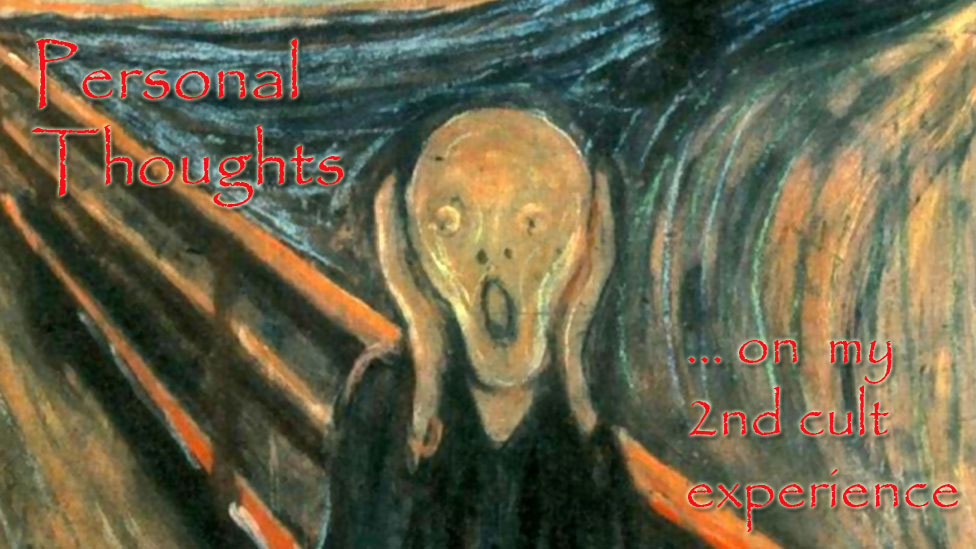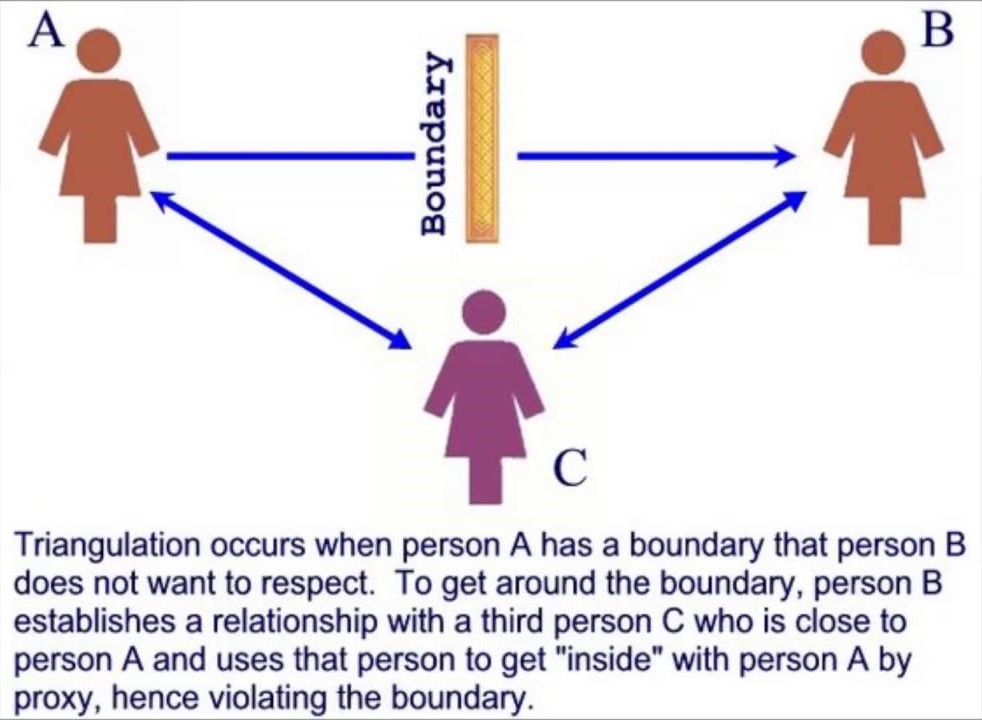November 2022

WARNING: If you have come out of the cult of which I am speaking, and you easily get your feelings hurt, then please read no further.
Introspection
I experienced a lot of internal turmoil trying to help or speak with the people coming out of the cult about which I have been writing. It was my second experience with a cult and one of many close encounters with a personality-disordered person (narcissist or psychopath). Even though I eventually recognized what was going on and departed from the group relatively fast, it still took its toll. Once again, I disregarded the warnings of cult expert Dr. David McDermott. He told me not to try to help anyone until I had at least a year or two under my belt away from toxic organizations and people. I was just two weeks past quitting my incredibly toxic and draining job (which also displayed many cult traits), so I was nowhere near that mark. Dr. McDermott stated, and I paraphrase,
After you start moving past the disbelief and anger over what was done to you in a cult, you will try to warn others about it and even help them. Don’t do it. 1) Most of them won’t believe you and will probably turn on you, and 2) It will open the door to all the anger and pain you felt in the past, not just with the cult, but with anyone who ever abused you all the way back to your childhood.
Words Are Cheap
He was, once again, correct. On both counts. I found myself unable to sleep at night, perpetually irritable and angry, avoiding talking or meeting with people, and then the inevitable nightmares. Not terrifying nightmares, just annoying dreams reliving things I had already escaped. I couldn’t help anybody anymore, even if I wanted to. This was compounded by a perceived disingenuousness among some of those coming out of the cult who contacted me. I saw a lot of disconnect between words and actions. Those who have read some of my other writings know that this is one of my main measurements that warns against toxic situations. Below are some words that I heard, that did not line up with actions.
“We missed you and your daughter.” Yet, nobody contacted us for a year. Total silence. If you miss someone, you reach out to them. I’m sorry, but I don’t believe these words.
“If only I had known what was going on.” How convenient that we can never verify this. It is a “what if” scenario in an alternate timeline. Here is my truth. You are a grown adult. You should have known what was going on. Why would I want to accept someone in my life again who remains blind and oblivious to this level of abuse, remaining in a group that abuses others as long as they are not personally affected?
“You need to forgive.” This one makes my blood boil. It almost always comes from the person who wronged you. The translation is, “I want to restore our relationship to what it was before I shunned you, but I don’t want to put in any effort or work to restore it. You need to just get over your pain and mistrust. You are the victim, but it’s all on you.” Using a banking analogy, if a person owes money and doesn’t pay it back, then forgiving that person means they no longer owe that money. It does not mean that they will continue receiving loans. It is the choice of the aggrieved person whether or not to loan again, just as it is the choice of the aggrieved person whether or not to accept attempts at restoration. In most cases, there isn’t even an attempt to restore, just blame shifting.
“We were told you didn’t want to be contacted.” Once again, you are grown adults, not small children and the cult leader is not your daddy. If you will believe whatever someone says about me without even bothering to ask me if it is true, then I do not want you in my life.
“I am sorry that I did not reach out to you.” This is, to me, the most genuine response. It opens the door to restoration, but there is still a long way to go. This sentence alone will not solve anything without a long period of corresponding positive actions. The sad reality however, is that I don’t know if I’m open to receiving positive actions anymore.
In a nutshell, words are cheap. I’ve reached a point in my life where I don’t believe them unless they are backed up with significant historical proof of matching actions. That takes years and I am tired. These people may feel outraged at what I said above. They may feel that they have no obligation at all towards me. They are correct, but neither do I have any obligation towards them. Moreover, they are the ones who contacted me. I did not initiate contact after having moved on from being shunned by them.
It Is All About Perspective
Many of them also responded to the cult leader’s condemnation and vilification of us on social media with a steady stream of hearts, likes, and “We stand with you!” (Standing with the cult leader, not the shunned.) Not just once, but every time a new person was thrown out or hurt in some way and raised an issue. No love, no sympathy, not even neutrality. They enthusiastically joined in supporting and encouraging the cult leader. All of us shunned outcasts watched what looked like a feeding frenzy to bash the unworthy. Now the same people who participated in the bashing want fellowship with us when they are now the ones being rejected? No, that is probably not going to happen.
A common theme with many of them is that it is all about them now. They are the ones who have been hurt. They are the ones who were not appreciated. They are the ones who were used. They are the ones who need comfort and help. They are the ones who need a new group to join. These are all valid and understandable feelings. They were all manipulated and used by the cult leader without their informed consent. They were violated, but have no legal recourse. All the rest of us who left before them are in the same boat. However, there is little or no introspection going on about who they hurt in the past while still cult members, who they shunned and left without help or comfort, who they used, and who had no group to join. I and others faced this alone and managed to make it through. It is also understandable that we have little sympathy for a large group of people coming out of the cult who at least have each other to lean on. We had nobody and it was this same group who took part in hurting us.
The bottom line is that people bailed out of the cult because of a major and serious doctrinal change, not because they recognized that I or any of the other outcasts had been wronged in any way. Past actions are a good indicator of future performance. Why would I want to associate with a person who has kicked me to the curb in the past, especially when I did nothing to wrong or harm them?
The Stark Reality of Mind Control
I get it. I understand better than most, having both been through it and then researched the dynamics. These people are victims of mind control and their actions are not their fault. However, neither is any of this my fault. This understanding also does nothing to remove the pain and mistrust of having been shunned and kicked to the curb for a year. If you think I was treated badly, imagine the man whose marriage the cult destroyed and then dog piled on him as the “evil” one. That is the reality of mind control’s collateral damage. It is not my responsibility or desire to restore things. I doubt others who were hurt will want to restore them either. This is your new reality. Learn from it, move on, and don’t make the same mistakes again.
Conclusion
Yes, I’m still up for personal friendships with some of these people. I don’t think they are bad people. They are victims of mind control, as was I at one time. I lost my entire extended family, my friends and my home because of it. I didn’t get any of those back no matter how hard I tried. It is the responsibility the person who hurt the other to make restitution if they want restoration. Even then, it might not succeed. A couple of flowery words doesn’t cut it. At least not for me. While I appreciate all their words, which in some way validate what I and the previous outcasts experienced, they do not repair anything that happened in the past. Only time and positive actions will do that. Time will tell if these are forthcoming.
The reality is that I am not capable of giving what I thought I could give. I know these people need help and I feel empathy for them, but I also feel conflicting anger at how they treated me and others. I’m too close to the situation, so I’m not the man for this job. I need to focus on keeping my own life and family together, just as all these people focused on keeping their own lives and families together after my departure. It is not pleasant and it is not fair. But it is real. I apologize if I have offended or hurt anyone with these words. That is not my intent in writing this. My intent is to share my perspective and my reality. The nature of both is that they may not be easily accepted or believed. That matters not to me.
Epilogue
Two years later, I am no longer in contact with any of the members or former members of the religious cult, much less have friendships with any of them. There were some brief contacts, condolences and even a few thanks, but it was clear nobody wanted to foster any kind of relationship with another. I don’t blame anyone, as I did not feel like doing so either. The shared hardship was of a different sort than fighting alongside each other in a war, or playing together on an athletic team. We were all fool, tricked and duped into an ignoble cause. We gradually fell by the wayside as we either grew wise to the charade or were thrown out by the leader and into confusion. There was no solidarity. It did the opposite of building camaraderie. It isolated. Everyone seemed to want to get away from each other for the most part. A small, core group held together, ironically forming another high control religious group. I am not sure of their present status. This kind of scattering is common for those who leave or are discarded from cults. They are disillusioned and many have become mistrusting of other groups and people. Having been fooled so effectively, they doubt their own discernment, so they avoid religious groups entirely. Some even avoid religious people, not knowing who is a wolf in sheep’s clothing. Some families were split up in this way, hostile towards each other or just out of contact. The cult leader re-invented himself with a new religion and now has a new core group supporting him. Time will tell how that plays out, but I suspect it will simply be a repeat of what has happened before.

















